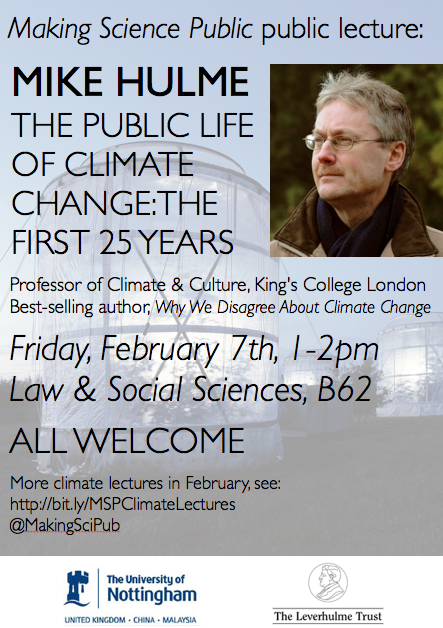January 14, 2014, by Warren Pearce
Blogs, publics and controversies: climate change lectures in February
 Time to unveil
Time to unveil three four FIVE! exciting climate change lectures hosted by Making Science Public in February. Superb speakers examining different perspectives on one of the defining issues of modern public life.
All are welcome to these lectures, all held on University Park campus.
Thursday, February 6th: 1-2pm, Law & Social Sciences (West Wing), A100
Amelia Sharman (London School of Economics and Political Science)
“Mapping the climate sceptical blogosphere”
Amelia highlights three key climate sceptic blogs’ focus on the scientific aspects of the climate change debate, their status as alternative sites of expertise, how they contribute to the contestation and delegitimisation of expert knowledge and how they may engage members of the public previously unengaged by the mainstream knowledge process.
UPDATE: listen to Amelia’s talk here.
Friday, February 7th: 1-2pm, Law & Social Sciences, B62
Mike Hulme (Professor of Climate & Culture, King’s College London)
“The public life of climate change: The first 25 years”
Since 1988, science, politics, culture and ethics have exerted changing influences on the idea of climate change. The ways in which climate change is deployed in public life have diversified and proliferated. This lecture describes some of these changes that have taken place over the last 25 years.
UPDATE: listen to Mike’s talk here.
Thursday, February 13th: 1-2pm, Law & Social Sciences (West Wing), A100
Sujatha Raman (Institute for Science and Society, University of Nottingham)
“Making Things Public: the challenges of materiality for renewable energy transitions”
The need to develop renewable energy (RE) options has been widely highlighted in light of climate change. But the fact that material resources are necessary to produce RE technologies is often ignored in these discussions. Analysing a range of sources where this issue is being made more visible, Sujatha asks what follows if we take the material basis of renewable energy seriously and how the framework of energy justice might help us in this regard.
UPDATE: listen to Sujatha’s talk and see her slides here.
Thursday February 27th: 1-2pm, Law & Social Sciences (West Wing), A100
Jenni Metcalfe (University of Queensland, Brisbane & Econnect Communication
‘Climate change ‘experts’ on the internet soapbox: democratising science and the media through blogs’
The rise of the blogosphere in the last decade has lead to a proliferation of digital voices on politicised scientific issues such as climate change. However, this does not mean that the ‘ordinary’ person, as compared to mainstream media representatives or scientific experts, has more engagement or influence in such issues than before the emergence of Web 2.0 technologies. The followers of issues-based and increasingly politicised blogs have tended to follow the elites – educated, mostly male bloggers with a background in journalism or writing. My research is finding that the dominant voices in the blogosphere conversations appear to be deniers of anthropogenic climate change with strong links to vested media and commercial interests. These links to vested interests make it harder for ordinary people to participate with expert scientists in the digital debate about climate change science. Despite this, there are opportunities for climate scientists to participate more actively in the blogosphere by being prepared to provide quick clear information about the latest climate science. Ordinary people can also participate more effectively in the blogosphere to increase their impact and voice by developing interest groups of concern and by networking and linking with influential groups, including mainstream media.
Friday, February 21st: 4-5pm, Sir Clive Granger Building, A40
Simon Gosling & George Swann (School of Geography, University of Nottingham)
“Myths & controversies about climate change”
The past decade has seen a number of myths and controversies about climate change played out in the media. In this talk, Simon and George will present both sides of the argument, from the standpoint of: 1) general media portrayal and sceptics; and 2) the scientific consensus, respectively. They will cover recent issue such as the hiatus (slow down in global warming) and Climategate.

I’m really glad to see these talks are happening; I will try to get there and will publicise them to other people. I was at Frazer Pearce’s talk on Global Warming a few years ago, to which I’d invited a climate change sceptic. I said at the time that there ought to be more public discussion on this subject than there was, but I’ve often been met with complacency when I suggest things like this. I think as time goes on there will be more and more consideration of both sides of the argument, as people who previously imagined the argument was done and dusted discover it is dragging on and on and they may have to look at the issue – and those they disagree with – with more patience.
Thanks for the positive comment. Feel free to contact me in advance if you are coming to any – particularly the ones in A100 as the entrance requires card access.
Your post gives one room (A100) for the first meeting and the blog gives a different one (B62). Which is it?
Hi Jonathan,
Are you referring to Amelia’s? That is in A100. Can you let me know where it says B62 please and I will amend.
Thanks.
Hi there, these look great and Id be interested in attending, but as i work 9 to 5 i will not be able to make any of them. thanks.
Hi Jane,
Sorry to hear that. We will be recording some of the talks and will post links up asap afterwards.
We will be posting up details of a 6pm public lecture shortly. Hopefully will be of interest.
[…] Amelia Sharman gave a seminar last week ‘Mapping the Climate Sceptical Blogosphere’ to the Institute for Science and Society, as part of Making Science Public’s month of climate change lectures. […]